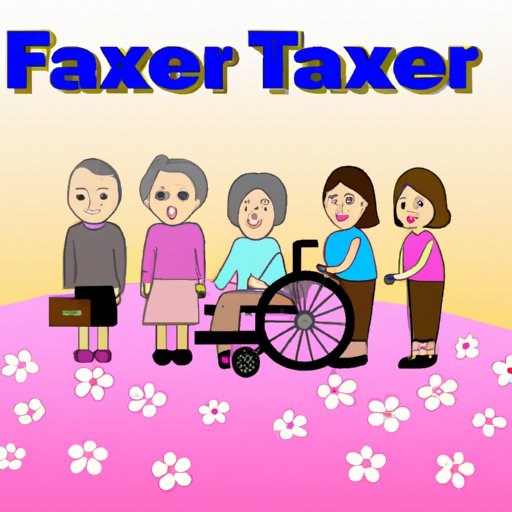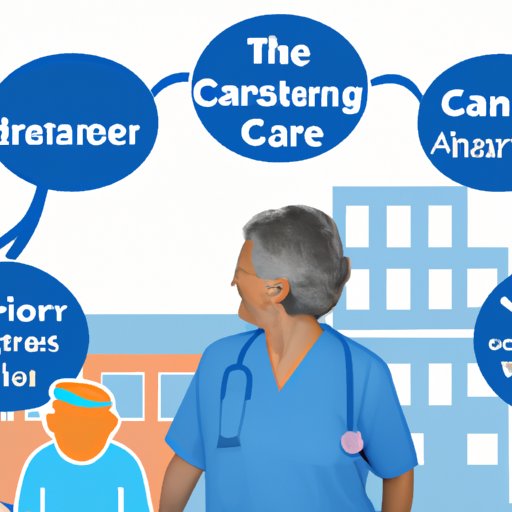Introduction
Caregiving is a noble and challenging profession that requires a great deal of patience, understanding, and dedication. It often involves providing physical, emotional, and social support to individuals who are unable to fully care for themselves due to age, illness, or disability. Caregivers may be family members, friends, neighbors, volunteers, or professionals.
As a caregiver, you face many challenges, including finding ways to pay for caregiving services. Fortunately, there are a variety of options available depending on your individual situation and needs. In this article, we’ll explore the various ways in which you can get paid for being a caregiver.

Become a Certified Home Care Aide
One way to get paid for being a caregiver is to become a certified home care aide. Home care aides provide basic personal care services such as bathing, dressing, grooming, and meal preparation in the patient’s home. They may also assist with light housekeeping, medication reminders, and other activities of daily living.
Becoming a certified home care aide has a number of advantages. For one, it is a relatively quick and easy process. You must complete a training program approved by the state in which you plan to work, pass a certification exam, and obtain a license before you can begin working. Additionally, most states offer competitive wages and benefits for certified home care aides.
Research Local and State Programs for Financial Assistance
Another option for getting paid for being a caregiver is to research local and state programs for financial assistance. Many states offer programs that provide financial assistance to caregivers, such as Medicaid, Medicare, and Social Security Disability Insurance (SSDI). These programs may cover some or all of the cost of caregiving services, depending on the individual’s income and assets.
In addition to these government programs, there may also be other types of assistance available in your area. For example, some states have programs that provide reimbursement for respite care and other services. To find out what programs are available in your area, contact your local Area Agency on Aging or Department of Health and Human Services.

Look for Private Pay Opportunities
Private pay opportunities are another option for getting paid for being a caregiver. Private pay usually refers to payment from the patient or their family, rather than from a government or insurance program. One advantage of private pay is that it can be more flexible than government programs, which typically require that services be provided according to certain guidelines. Private pay also often allows caregivers to negotiate their own rates, which can be beneficial if they want to charge higher rates than those offered by government programs.
To find private pay opportunities, you can start by asking family, friends, and neighbors if they know anyone who might need a caregiver. You can also check online job boards and classifieds, or contact local home care agencies to see if they have any openings. Additionally, many hospitals and nursing homes offer private pay opportunities, so make sure to ask around.

Utilize Family Caregiver Tax Benefits
Family caregivers can take advantage of tax benefits when filing their taxes. Depending on the situation, caregivers may be able to deduct expenses related to caregiving, such as transportation costs and medical supplies. Additionally, family caregivers may qualify for the Child and Dependent Care Credit, which can provide up to $3,000 in tax credits for each qualifying dependent.
To claim family caregiver tax benefits, you will need to complete IRS Form 2441 and attach it to your tax return. You will also need to provide documentation of your expenses, including receipts and invoices. If you are unsure of how to complete the form or what documentation is required, you should consult a tax professional for assistance.
Consider Becoming an Independent Contractor
If you’re looking for more autonomy and flexibility, you may want to consider becoming an independent contractor. As an independent contractor, you will be responsible for setting your own hours, rates, and terms of service. You will also be in charge of managing your own taxes and insurance. While this can be a great way to maximize your income, it does come with its own set of risks and responsibilities.
To become an independent contractor, you will need to register your business with the IRS and obtain appropriate licenses and permits. You will also need to obtain liability insurance to protect yourself in case of injury or damage. Finally, you will need to create an agreement with your clients outlining the services you will provide and the rates you will charge.
Take Advantage of Non-Monetary Benefits
While monetary compensation is important, there are also other forms of benefits that can be just as valuable. Caregivers may be eligible for non-monetary benefits such as health insurance, dental insurance, vacation time, and retirement plans. Additionally, many employers offer educational opportunities and discounts on products and services.
To find out what non-monetary benefits are available, contact your local Area Agency on Aging or Department of Health and Human Services. You can also check with your employer to see if they offer any additional benefits. Additionally, many organizations offer grants and scholarships specifically for caregivers, so be sure to do your research.
Conclusion
Caregiving can be both rewarding and challenging. Fortunately, there are a variety of options available for getting paid for being a caregiver. These include becoming a certified home care aide, researching local and state programs for financial assistance, looking for private pay opportunities, utilizing family caregiver tax benefits, considering becoming an independent contractor, and taking advantage of non-monetary benefits.
No matter which option you choose, it’s important to remember that taking care of others is a rewarding and meaningful experience. With the right resources and support, you can make a difference in the lives of those you care for.
(Note: Is this article not meeting your expectations? Do you have knowledge or insights to share? Unlock new opportunities and expand your reach by joining our authors team. Click Registration to join us and share your expertise with our readers.)
